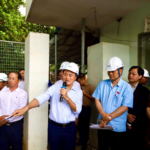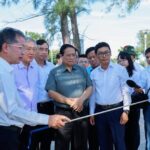The Chairman of the Ho Chi Minh City People’s Committee has recently concluded on the progress of the An Phu Intersection Construction Project. The conclusion emphasizes its critical role as the eastern gateway, significantly enhancing regional connectivity.

The An Phu Intersection construction site is urged to accelerate its progress to complete key components as directed by the Ho Chi Minh City People’s Committee.
Establishing a Progress Commitment
According to the Ho Chi Minh City People’s Committee, the project’s implementation remains behind schedule. The identified causes include inadequate oversight and lack of firmness from the Traffic Project Management Board towards underperforming contractors. Additionally, some construction units lack sufficient capacity, and state management by the Department of Construction and related departments remains limited.
The Chairman of the Ho Chi Minh City People’s Committee has instructed all units to critically review their performance and focus on ensuring the project’s timely completion.
The city has approved the solutions proposed by the Traffic Project Management Board and mandated the establishment of a progress commitment, holding them accountable to city leadership.
Specific milestones include completing the N2 bridge branch (XL11) by December 31, 2025, and the HC1-02 underpass (XL6) by January 15, 2026.
Developing Adjustment Plans Based on New Planning
Regarding the upgrade of Luong Dinh Cua Road (Tran Nao – Nguyen Thi Dinh section, Thu Duc City), the Chairman of the Ho Chi Minh City People’s Committee has tasked the Traffic Project Management Board with formulating adjustment plans aligned with the new planning, following approval by the Prime Minister, to be completed by September 2025. The Department of Finance is responsible for reviewing and balancing capital, as well as guiding project adjustment procedures in accordance with public investment laws.
For compensation and site clearance of the 22,012 m² area within the An Phu Urban Development Project, the Ho Chi Minh City People’s Committee has endorsed the Department of Finance’s proposal under Option 2. Relevant departments are urged to expeditiously advise and propose to the Prime Minister the project boundary adjustments, to be finalized by September 15, 2025.
The Department of Agriculture and Environment is tasked with reviewing financial obligations, issuing land use certificates, and addressing violations across 13 sub-projects, with a report due in September 2025.
Additionally, the Ho Chi Minh City People’s Committee has directed the Department of Finance to collaborate with relevant agencies to engage sub-project investors in fulfilling their financial commitments, with a report expected by September 20, 2025.
Vice Chairman of the Ho Chi Minh City People’s Committee, Bui Xuan Cuong, is assigned to directly oversee, monitor, and expedite the aforementioned tasks.
The Ultimate Guide to Finding Your Dream Home: Claim One of 3,790 Apartments in Saigon’s Thriving New Metropolis
The Ho Chi Minh City People’s Committee has unveiled an ambitious plan to auction 3,790 apartments in the Thu Thiem New Urban Area. This extensive process will be meticulously carried out in eleven well-defined steps, ensuring a transparent and efficient procedure.
The Prime Minister Leads Steering Committee for Developing a Proposal on Regional and International Financial Center Initiative
The Steering Committee is responsible for researching and proposing directions, tasks, and solutions for the construction and implementation of the Project for a Regional and International Financial Center. The Committee ensures that the proposed plans are feasible, effective, and adaptable to practical situations, with the ultimate goal of maximizing the potential and advantages of Vietnam.
















